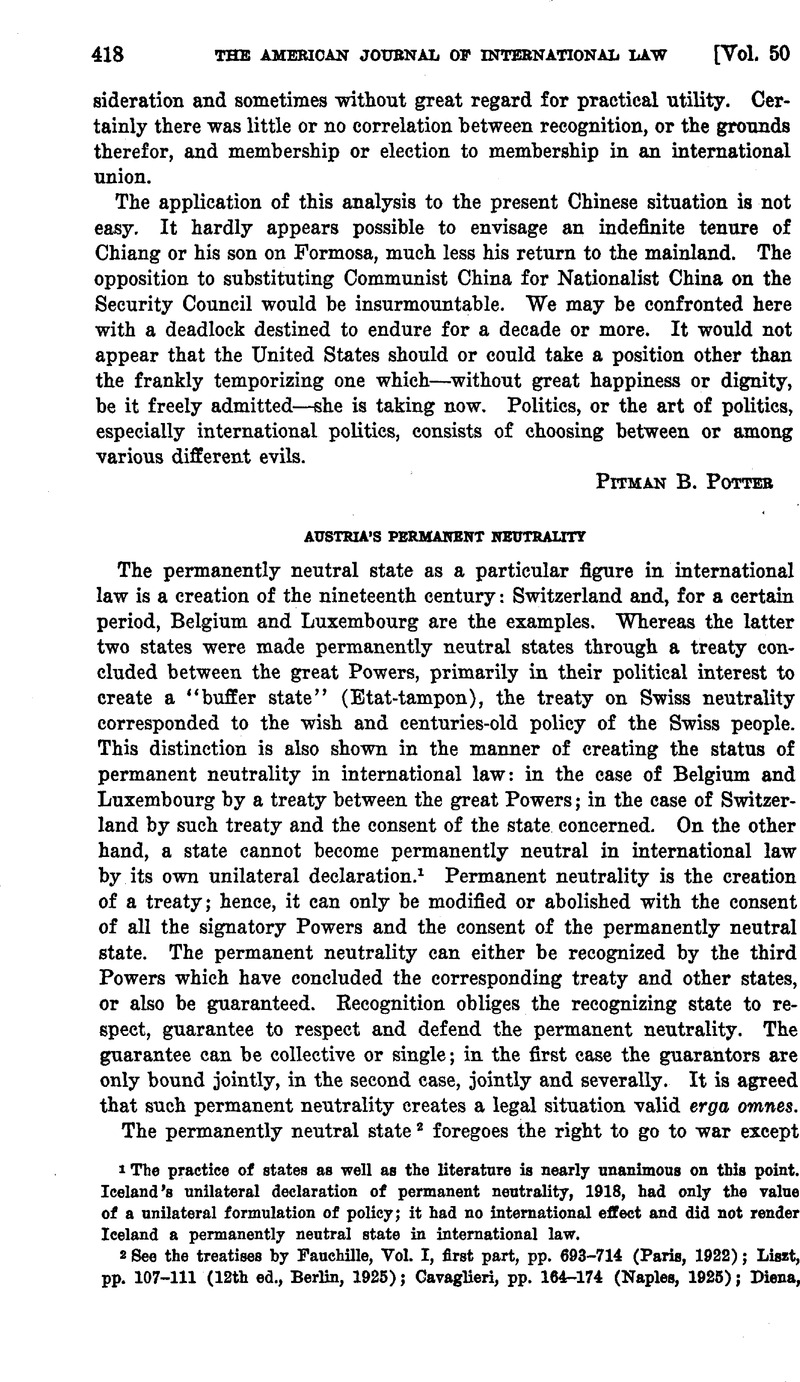Article contents
Austria’s Permanent Neutrality
Published online by Cambridge University Press: 28 March 2017
Abstract

- Type
- Editorial Comment
- Information
- Copyright
- Copyright © American Society of International Law 1956
References
1 The practice of states as well as the literature is nearly unanimous on this point. Iceland’s unilateral declaration of permanent neutrality, 1918, had only the value of a unilateral formulation of policy; it had no international effect and did not render Iceland a permanently neutral state in international law.
2 See the treatises by Fauchille, Vol. I, first part, pp. 693–714 (Paris, 1922); Liszt, pp. 107–111 (12th ed., Berlin, 1925); Gavaglieri, pp. 164–174 (Naples, 1925); Diena, pp. 105–113 (Milan, 1930); P. Guggenheim, Traité de Droit International Public, Vol. I, pp. 177–178; Vol. II, pp. 547–561 (Geneva, 1953). Of the many monographs we mention K. Strupp, Neutralisation, Befriedung, Entmilitarisierung (1933); Dollot, , “Essai sur la neutralité permanente,” 67 Hague Academy Recueil 7 ff. (1939).Google Scholar
3 Except if demilitarized by the basic treaty, as in the case of Luxembourg.
4 It is, therefore, not correct that Professor Charles G. Fenwick, in his International Law 107 ff. (3rd ed., 1948), puts the whole chapter on permanent neutrality into the “past tense.”
5 See this writer’s editorial in 49 A.J.I.L. 535–542 (1955).
6 See Foreign Ministers Meeting: Berlin Discussions (Department of State Publication No. 5399), p. 233.
7 It seems that the only authentic text of this Memorandum is in Russian, as published by the Moscow Radio and TASS in May, 1955. A German text was published by the Oesterreichische Zeitung (the organ of the Soviet forces in Austria) of May 22, 1955, and by the Oesterreichische Volksstimme (organ of the Austrian Communist Party) of May 27, 1955. Up to now, the German text can only be found in these newspapers. (This writer is indebted for this information as well as for the German text of the Moscow Memorandum and the text of the Austrian Neutrality Statute to Minister Plenipotentiary Dr. Stephan Verosta of the Austrian Foreign Office.) English text of the Moscow Memorandum in Supp. to New Times, No. 22 (Moscow, 1955); Sen. Exec. G, 84th Cong., 1st Sess., p. 40; 32 Dept. of State Bulletin 1011–1013 (1955); and in 49 A.J.I.L. Supp. 191–194 (1955).
8 The German text is “gehandhabt,” which rather corresponds to handle, manage, administer, practice.
9 Bundesverfassungsgesetz vom. 26. Oktober 1955 über die Neutralität österreichs (B. G. Bl 1955, Nov. 4, 1955, No. 211).
10 In the German original: “aus freien Stücken.”
11 The four Powers are already bound by Art. 2 of the State Treaty with Austria to “respect” the independence and territorial integrity of Austria.
12 In his Report to the President the American Secretary of State had this to say on this point: “The guarantee desire of the Austrian Government is understandable, but the Government of the United States has made no commitments with regard thereto.”
13 The United States recognized Austria’s perpetual neutrality by the U. S. note of Dec. 6, 1955, in answer to the Austrian note of Nov. 14, 1955. 33 Dept. of State Bulletin 1011–1012 (1955).
14 See e.g. Schweizer, Geschichte der schweizerischen Neutralität (1895); Bonjour, Geschichte der schweizerischen Neutralität (1946); C. Gorgé, La neutralité helvétique (1947); Robert, Etude sur la neutralité Suisse (1950).
15 See e.g. Borel, in Revue Générale de Droit International Public, 2e sér., Vol. II, pp. 153 ff.; W. Rappard, in Munch, L’origine et l’oeuvre de la Société des Nations, Vol. I, pp. 379 ff.; Mettetal, La neutralité et la Société des Nations; Schücking-Wehberg, Die Satzung des Völkerbundes 207–210 (2nd ed.).
16 New York Times, Dec. 16, 1955, p. 4.
17 See his article in 50 A.J.I.L. 61–68 (1956).
18 In the exercise of this freedom Austria has decided to join the Council of Europe. “We are a militarily neutral state, but there is no ‘neutralism’,” the Austrian Foreign Minister declared (New York Times, Feb. 22, 1956, p. 8). Switzerland has not joined. But as the Council of Europe is purely advisory and non-military in character, a permanently neutral state certainly has a right to join.
19 33 Dept. of State Bulletin 788–790 (1955).
- 7
- Cited by


